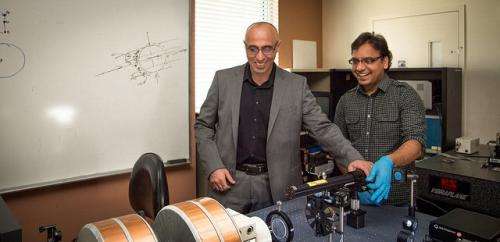Quantum mechanics to charge your laptop?

Top scientists from UC Berkeley and MIT found the expertise they lacked at FIU. They invited Sakhrat Khizroev, a professor with appointments in both medicine and engineering, to help them conduct research as part of their NSF-funded Center for Energy Efficient Electronics Science.
The group is looking to cut the cord, literally, by finding ways to efficiently power computers of the future. Energy consumption from laptops, huge data centers and every other Internet-connected electronic device is rising exponentially and could impact available resources down the road. To reverse this energy-guzzling trend, the Berkeley-based center is investigating the use of revolutionary nanotechnology—the manipulation of matter on an atomic, molecular and supramolecular scale—to create endlessly charged atomic batteries that could supplant our reliance on the plug.
"I am honored," says Khizroev of his inclusion on the elite team. His peers tapped him because they needed an expert in something called "the magnetic spin of electrons and spintronic devices," as he explains it.
Discovered in the 1980s, spintronics harnesses the magnetism and constant gyroscopic spin of electrons to process data. With a naturally negative charge, electrons are subatomic particles that orbit around an atom's nucleus like the rings around Saturn, and their magnetic energy could provide theoretically limitless power.
Such continuous energy would not just solve our mundane (and incessant) need to recharge tablets and cell phones, it could also move computing to the next level. "You can say that our research is a stepping stone towards achieving a holy grail of computer processing known as quantum computing," says Khizroev of the physics that would allow the crunching of numbers at breathtaking speeds but which currently is constrained by huge energy requirements. "Then anything is possible," he says. "Eventually it will happen, but we're not there yet."
Quantum computing is so complicated that it exists mostly as a theory. That could change with the research taking place in the Berkeley center and in FIU's labs. In 2013 Khizroev published research on the discovery of the world's smallest version of an energy-efficient information processing technique, called spin-transfer torque.
Jeffrey Bokor, deputy director of the center and leader of the nanomagnetics team, calls Khizroev's work "pioneering." It is the application of Khizroev's findings, Boker explains, that will be explored by the center's researchers as they consider new concepts for computers powered entirely by magnetic devices.
These atomic processes (none of which involves the chain reaction on which nuclear power plants rely) are mind-boggling to any non-engineer, and even many engineers remain skeptical of their application. Like his colleagues at the center, Khizroev has no doubts.
"Nanotechnology is everywhere in the future," predicts Khizroev, who holds more than 30 patents and is a fellow of the National Academy of Inventors.
At FIU he dedicates 80 percent of his time to medicine and has published academic papers on nanomedicine to treat HIV and ovarian cancer. He is also pioneering the use of nanoparticles to treat brain disorders such as Parkinson's disease.
But that work took a temporary backseat recently when Khizroev returned to his roots as a physicist and electrical engineer when he invited FIU graduate students Ali Hadjikhani and Mark Stone to travel with him to the Berkeley center for some brainstorming.
"I did not completely forget my old expertise," Khizroev says, "but it's more like a hobby. A side project."
Hobbyist or not, he remains among the world's elite researchers seeking novel ways to power the future.
Provided by Florida International University



















